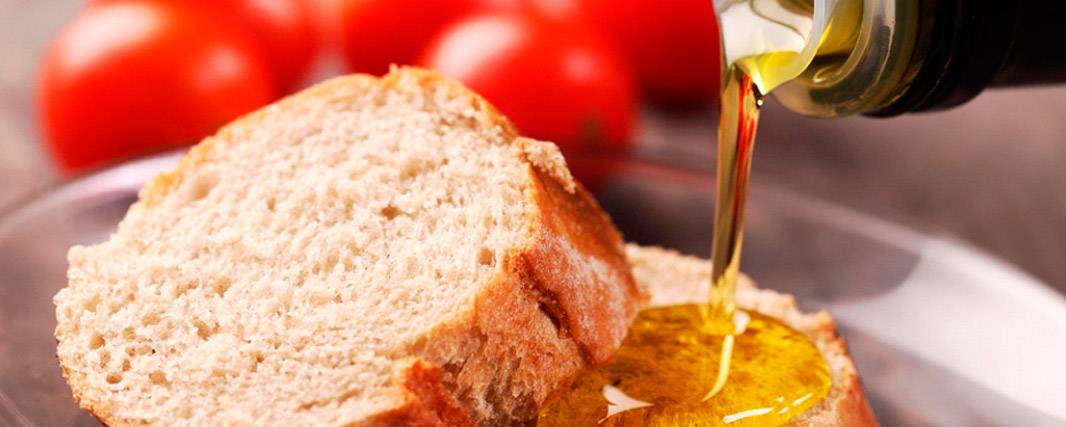
Today on our blog we are posting an article on olive oil published by INTEREMPRESAS, INDUSTRIA DEL ACEITE (a website devoted to the olive oil industry). It is such an interesting article that you shouldn’t miss reading the full text. I hope the article confirms what we already know about our liquid gold, that it is a healthy and tasty gift that improves every dish.
Olive oil is considered to be one of the best oils from a nutritional standpoint, since its phenolic antioxidant compounds make it the best oil for human consumption. It is been associated with a decrease in cardiovascular problems in countries whose dietary patterns are based on the Mediterranean diet, where olive oil is the main source of fat. A large number of studies have proved its health benefits and health properties, which make it an excellent source of health.
Olive oil is the main source of fat in Mediterranean countries, whose diet has been associated with a low incidence of cardiovascular disease (1). Data from the EPIC (Spain) and Three Cities (Italy) has shown an inverse relation between olive oil consumption and cardiovascular disease (2-5).
Numerous studies have demonstrated the benefits of olive oil consumption on lipid profile, insulin sensitivity, oxidation of lipids and DNA, endothelial function and blood pressure (6,7).In consequence, in November 2004, the US Federal Drug Administration (FDA) allowed a health claim in olive oil bottles referring to «the benefits of consuming two tablespoons of olive oil on the risk of Cardiovascular disease due to the high presence of monounsaturated fat in olive oil «(8).
Olive oil components
The major components of olive oil are fatty acids. Among them, the predominant component is a monounsaturated fatty acid called oleic acid. Olive oil contains bioactive compounds, among which antioxidant phenolic compounds are the best-studied (7). Extra virgin olive oil with acidity levels inferior to 0.8 g has the highest phenolic content among olive oils in the market, compared with common olive or pomace oils, which have been mixed with refined olive oil and have lost virtually all their phenolic compounds.
Benefits of extra virgin olive oil
The key question is: what is the best oil from a nutritional standpoint? Available current data suggests the answer is Extra Virgin Olive Oil.
Apart from its well-known benefits on the improvement of lipid profile risk (decreased levels of LDL cholesterol, ‘bad’ cholesterol), lower oxidation of LDL cholesterol, improved endothelial function and insulin sensitivity, olive oil is also known for its great antioxidant and anti-inflammatory capacity due to the abundance of phenolic compounds. (7).
The phenolic compounds are absorbed by the human organism in a dose-dependent manner on the content present in olive oil (9).
Extra Virgin Olive Oil rich in phenolic compounds has been shown to protect LDL from oxidation (particle bearing bad cholesterol) more effectively than other oils. Cholesterol oxidation is a key process for triggering atherosclerosis that leads to angina pectoris, myocardial infarction, or stroke (10).
Data from EUROLIVE, a study conducted in 6 European countries with 200 healthy volunteers, has showed the benefits of olive oil rich in phenolic compounds compared with other types of olive oils with regard to HDL cholesterol levels and protection against oxidation of LDL (11).
In the light of the EUROLIVE study and other studies, the European Food Safety Authority (EFSA) allowed a claim in November 2011 regarding the benefits of consumption of phenolic compounds in olive oil: 5 mg / day of hydroxytyrosol and derivatives (including oleaborin and tyrosol) on the protection against the oxidation of LDL. These amounts (20 g / day) should be consumed in moderation and as part of a balanced diet (12, 13).
HDL particles (carrying ‘good’ cholesterol) protect LDL from oxidation and is also responsible for removing cholesterol from the arteries by a process called ‘cholesterol efflux’.
A subsample of the EUROLIVE study has shown that olive oil rich in phenolic compounds not only increases HDL cholesterol levels, but also cholesterol efflux of the cells significantly more than any refined olive oil that is poor in phenolic compounds (14).
Studies in humans have shown that AOVEs is more effective against inflammation, reduction of thrombogenesis (creation of blood clots), improvement of endothelial function and reduction of blood pressure than other oils (7).
Within the framework of the PREDIMED study (Effects of the Mediterranean Diet on the Prevention of Cardiovascular Disease), a rich Mediterranean diet based on extra virgin olive oil has not only been shown to protect against lipid oxidation and inflammation (15,16), but also against cardiovascular disease ( 1) and, in particular against atrial fibrillation (risk of arrhythmia) (17) and the development of diabetes (18).
In both cases this would entail protection against oxidation of lipoproteins. While the benefits of LDL oxidation protection have already been discussed, protection against oxidation of HDL would lead to an improvement in their ability to enhance cholesterol efflux from blood vessels by preventing cholesterol accumulation in them and protecting against atherosclerosis (14).
A second mechanism would be through a nutrigenomic effect. AOVEs have been shown to be more effective than other types of oil for reducing the expression of genes related to atherosclerosis and inflammation in humans (20).
Fort the above reasons, extra virgin olive oil consumption provides more benefits to human health than other vegetable oils.
